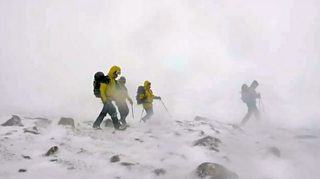Excess all areas: how 80s extravagance ended Scottish pop dreams
In the 1980s record labels couldn't get enough of bands from Scotland, but it wasn't to last.
The invention of the CD was a pivotal moment for record companies, and one which reaped them huge rewards. They discovered that by re-releasing artists' entire back catalogues on the new format they could convince music lovers to buy the albums they already owned all over again.
As the profits rolled in, the labels were quick to splash the cash on their artists. This period coincided with a trend for signing bands from Scotland, and those who were caught up in the whirlwind discovered there were enormous benefits to be had. However as When Scotland Rock and Ruled reveals, these good times weren't to last.

The next big thing
For a period during the 1980s, venues and rehearsal rooms in Glasgow and Edinburgh would be flooded with A&R men from London and further afield who had flown in in search of their next signing.
One of those bands which signed a deal was Love and Money. When they signed to Mercury Records, the boys from Glasgow were whisked off to the Mojave Desert in the US to film a video for their first single, .
“It felt like from the minute we signed things got moving and kept moving," explained the band’s singer, James Grant.
“We were so, so busy at the time you hardly had a chance to think. You were kind of swept away, it all seemed pretty surreal.”

Industry excess
Love and Money’s experience was not unusual. Rising stars Wet Wet Wet also found themselves far from home when they jetted off to Gambia to shoot the video for their second single, .
Music writer John Williamson recalls that during the 1980s extravagant video shoots were all too common:
“It kind of started to become normal and then other bands wanted to do it."
Many of the bands signed comprised of young lads from unemployment hot spots in central Scotland. A record deal gave them opportunities they may never have otherwise had. And with perks such as travel to exotic locations and the best producers working on their albums, these were good times to be in a band.
They weren't to continue.

Tightening purse strings
Rab Andrew, manager of Texas, remembers the changes creeping in.
“Record execs in later years were chasing bigger bonuses, bigger guarantees. They had to cut down their costs to increase their profit margins.
"They changed their thinking. They became cautious."
The cutbacks took their toll on Scottish bands. Over a two year period at the end of the 80s, nearly 20 bands were dropped by their labels.
John Williamson heard about the changes first hand.
"It went though a period where everybody was trading stories about how successful they were, and how much money they had spent on their record or video, or what producer they’d worked with, or where they'd recorded,"
"It rapidly went from that to people telling you the stories of how it had all gone wrong."
-
![]()
When Scotland Rock and Ruled
Jackie Bird looks back at Scotland's most prolific decade musically, the 1980s speaking to Jim Kerr of Simple Minds, Gary Clark of Danny Wilson and James Grant of Love And Money.
Latest features from ��ѿ��ý Scotland
-
![]()
'Wild swimming helps me process the grief of losing my son'
The benefits of cold water therapy.
-
![]()
Winter adventures are appealing, but an expert advises caution
Trips in winter require particular knowledge and skills.
-
![]()
The rescuers: Why volunteers risk their lives in mountain emergencies
Landward meets members of the Cairngorm Mountain Rescue Team.
-
![]()
‘Look for the light’ – practical tips to help you through another winter with SAD
Useful advice and tips to combat low moods at this time of year.
-
![]()
How you could be a binge drinker without even knowing
Binge drinking is classed as fewer units than many people may realise.
-
![]()
How chocolate biscuits and drama classes helped one man leave prison behind
The healing power of creativity.
-
![]()
'When people believe in you, it’s life-changing'
Author Graeme Armstrong revisits the man who helped turn his life around.
-
![]()
The 'breath-taking' display of US birds swept on to British soil
Recent storms have brought rare birds to our shores.
-
![]()
Six things we learned about Alan Cumming on Take the Floor (Spoiler: includes accordions)
The actor spoke to Take the Floor's Gary Innes.
-
![]()
How street gangs trap young men in a dangerous cycle of violence
The almost inescapable pull of life in a gang.
-
![]()
Why stylist Gok Wan believes there's no such thing as bad fashion
The fashion expert says we should stop following rules and do what feels right.
-
![]()
Is sending a CV still the right way to apply for a job?
They've been central to job applications for years, but are they worth it?




















